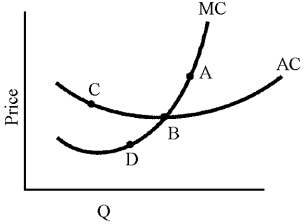Exam 12: Between Competition and Monopoly
Exam 1: What Is Economics?227 Questions
Exam 2: The Economy: Myth and Reality150 Questions
Exam 3: The Fundamental Economic Problem: Scarcity and Choice250 Questions
Exam 4: Supply and Demand: An Initial Look308 Questions
Exam 5: Consumer Choice: Individual and Market Demand202 Questions
Exam 6: Demand and Elasticity209 Questions
Exam 7: Production, Inputs, and Cost: Building Blocks for Supply Analysis216 Questions
Exam 8: Output, Price, and Profit: The Importance of Marginal Analysis189 Questions
Exam 9: Securities: Business Finance, and the Economy: The Tail that Wags the Dog?198 Questions
Exam 10: The Firm and the Industry under Perfect Competition208 Questions
Exam 11: Monopoly203 Questions
Exam 12: Between Competition and Monopoly225 Questions
Exam 13: Limiting Market Power: Regulation and Antitrust152 Questions
Exam 14: The Case for Free Markets I: The Price System220 Questions
Exam 15: The Shortcomings of Free Markets212 Questions
Exam 16: The Market's Prime Achievement: Innovation and Growth110 Questions
Exam 17: Externalities, the Environment, and Natural Resources217 Questions
Exam 18: Taxation and Resource Allocation219 Questions
Exam 19: Pricing the Factors of Production228 Questions
Exam 20: Labor and Entrepreneurship: The Human Inputs223 Questions
Exam 21: Poverty, Inequality, and Discrimination167 Questions
Exam 22: An Introduction to Macroeconomics211 Questions
Exam 23: The Goals of Macroeconomic Policy207 Questions
Exam 24: Economic Growth: Theory and Policy223 Questions
Exam 25: Aggregate Demand and the Powerful Consumer214 Questions
Exam 26: Demand-Side Equilibrium: Unemployment or Inflation?210 Questions
Exam 27: Bringing in the Supply Side: Unemployment and Inflation?223 Questions
Exam 28: Managing Aggregate Demand: Fiscal Policy205 Questions
Exam 29: Money and the Banking System219 Questions
Exam 30: Monetary Policy: Conventional and Unconventional205 Questions
Exam 31: The Financial Crisis and the Great Recession61 Questions
Exam 32: The Debate over Monetary and Fiscal Policy214 Questions
Exam 33: Budget Deficits in the Short and Long Run210 Questions
Exam 34: The Trade-Off between Inflation and Unemployment214 Questions
Exam 35: International Trade and Comparative Advantage226 Questions
Exam 36: The International Monetary System: Order or Disorder?213 Questions
Exam 37: Exchange Rates and the Macroeconomy214 Questions
Select questions type
A market which firms can enter if they choose and exit without losing money invested is
(Multiple Choice)
4.8/5  (42)
(42)
Figure 12-2
 -In Figure 12-2, which of the graphs represents a monopolistic competitor in long-run equilibrium?
-In Figure 12-2, which of the graphs represents a monopolistic competitor in long-run equilibrium?
(Multiple Choice)
4.8/5  (39)
(39)
Where interdependence is especially pronounced, competition among oligopolists will
(Multiple Choice)
4.9/5  (30)
(30)
The goal of the manager of a firm is sales maximization.The firm will produce
(Multiple Choice)
4.7/5  (41)
(41)
Society benefits from monopolistic competition because the firms are allocatively efficient.
(True/False)
4.8/5  (40)
(40)
The maximin criterion seeks to minimize the maximum payoffs in order to win.
(True/False)
4.8/5  (42)
(42)
According to the excess capacity theorem, if every firm under monopolistic competition expanded its output,
(Multiple Choice)
4.8/5  (36)
(36)
Figure 12-1
 -In Figure 12-1, for a monopolistically competitive firm, long-run equilibrium can occur only at the quantity indicated by which point?
-In Figure 12-1, for a monopolistically competitive firm, long-run equilibrium can occur only at the quantity indicated by which point?
(Multiple Choice)
4.8/5  (36)
(36)
A successful cartel may end up charging the ____ price and obtaining ____ profits.
(Multiple Choice)
4.8/5  (29)
(29)
The maximin criterion can be defined as which of the following?
(Multiple Choice)
4.7/5  (38)
(38)
The monopolistically competitive firm in short-run equilibrium
(Multiple Choice)
4.9/5  (40)
(40)
To maximize sales revenue, an oligopolist will expand output until the elasticity of demand becomes
(Multiple Choice)
4.9/5  (47)
(47)
Economists tend to be concerned about entry barriers.Why are entry barriers so important?
(Essay)
4.9/5  (43)
(43)
Monopolistic competitors and perfect competitors are alike in
(Multiple Choice)
4.8/5  (36)
(36)
The airline dominating Charlotte, North Carolina, once contended that it could not overcharge for fear of potential competition, if not at Charlotte, then at Raleigh, a two-hour drive away.Do you find this argument compelling, given the theory of contestable markets?
(Essay)
4.8/5  (37)
(37)
An advertising race among oligopolists may be rational if it
(Multiple Choice)
4.9/5  (34)
(34)
Showing 201 - 220 of 225
Filters
- Essay(0)
- Multiple Choice(0)
- Short Answer(0)
- True False(0)
- Matching(0)